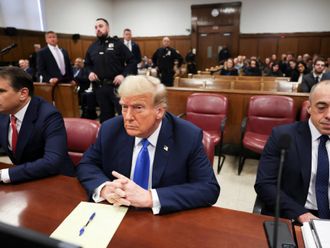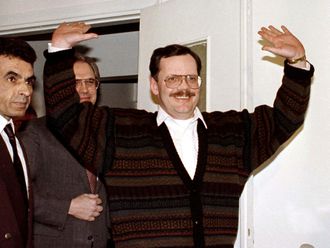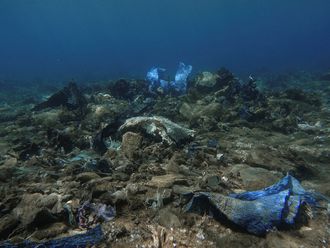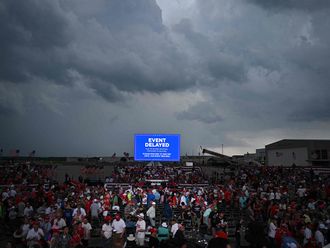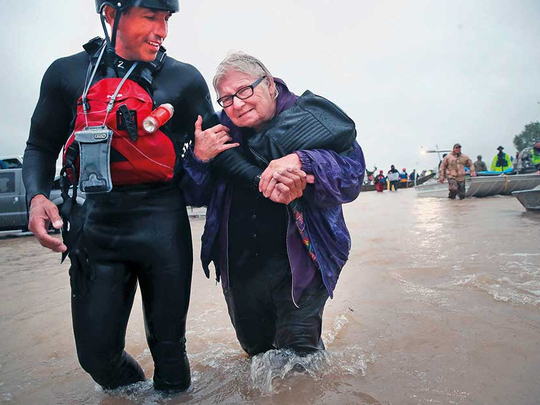
Woodlands John Brown brought his fishing boat, a battered 16ft skiff, and piloted it around submerged streets and avenues, seeking strangers to rescue. Dale Montalban brought his wetsuit and waded into the churning murk, escorting people to the boats and hauling their bags.
Cassandra Luna bought a $9.95 life vest from Walmart and brought it in case someone, anyone, might need it.
All three were among the throngs of volunteers who fanned across flooded areas in and around Houston on Monday.
They vowed to do so all week.
No one sent them and no one paid them - yet for the sake of people they had never met, they exposed themselves to pelting rain and ominous warnings that Hurricane Harvey, now a tropical storm, would unleash fresh mayhem.
“I think it’s beautiful, everybody coming together to do this,” said Brown, 41, a metalworker.
He spoke amid a grim scene: flood waters surged through Woodlands, a community just north of Houston, marooning hundreds of families in their homes.
The affluent High Oaks neighbourhood was especially badly hit, turning leafy streets and avenues into waist-high bayous.
Yet Brown had left his own home 30 miles away, itself partially submerged, and driven through torrents to offer his boat and expertise to people in need. Montalban felt the same compulsion and laboured for hours amid rising waters to deliver families, property and pets to relatively dry land, where vehicles shuttled took them to shelters.
Luna, 25, turned up with her offering of an orange life vest, still with its price tag.
“I was imagining there wasn’t going to be any help. But there are so many people here.”
Here was the America of the ideal: one nation, indivisible.
A republic of citizens looking out for each other. No politics or polarisation. No fake news or social media bubbles.
A crisis all could see, and a response all wanted to be part of.
How long would it last? Donald Trump was due in Texas on Tuesday so perhaps the clock was ticking.
But for one day at least, there was unity among the rescuers and rescued, a coalition of races and income groups.
And there was, remarkably, calm.
The storm continued to rage with eight confirmed dead, 120,000 without power and much of the landscape unrecognisable.
But the rescue operation in High Oaks unfolded with composure and flashes of humour.
It was all the more impressive because just two of the seven boats that plucked residents to safety belonged to the fire department.
The rest were owned and operated by private individuals.
“The private response has been tremendous,” said David Polnick, a lieutenant with the Woodlands fire department.
“I’ve even had to turn help away because there’s been so much. Everything’s going good so far. About a hundred people have come out.”
He did not know how many residents remained.
Most of the volunteers appeared to be Texan but they reflected the spirit of Louisiana’s Cajun Navy, a volunteer rescue force that responds after natural disasters.
In two isolated cases in Houston one group nearly had a boat stolen and another group was shot at when it did not pick up a group of stranded people.
“Why do I do this?” Brown mused as he directed his skiff past a lamppost and some fallen trees.
“Well, why not?”
He had picked up more than 50 people by early afternoon and intended to continue till after dark.
On one run he wheeled off Sawmill Road, docked on some mud and sloshed up South Summer Star Court seeking an elderly couple reportedly in need of evacuation.
He found them but they refused to leave.
Brown ended up taking another couple, a French man and Japanese woman, and directed a family of four, the Caetanos, to another boat.
They thanked him and waved goodbye.
A few miles away a Cinemark theatre was screening another, bloodier evacuation with its own feelgood ending: Christopher Nolan’s Dunkirk.
One boat returned with an elderly couple, Dora and Ted Perez, the latter in a wheelchair.
Another came laden with dogs.
Mario Aguirre used an inflatable pool to transport food and kitchenware.
Claire Torres, 29, clambered out of a boat cradling an infant.
She was smiling. “It’s all good. We have a place to stay.”
A grandmother from the Anderson family arrived in a later boat with a gurgling newborn, Alexia, in a blanket.
“I hear you, pumpkin,” she said.
Samaritans worked across the city.
A family in a black SUV got stuck in a torrent on the I45 and risked being swept away until spotted and extracted by Nick and Jeremy Hicks, brothers who own a tow-truck business. Nick anticipated doing more rescues. “You bet. It feels good, man.”


